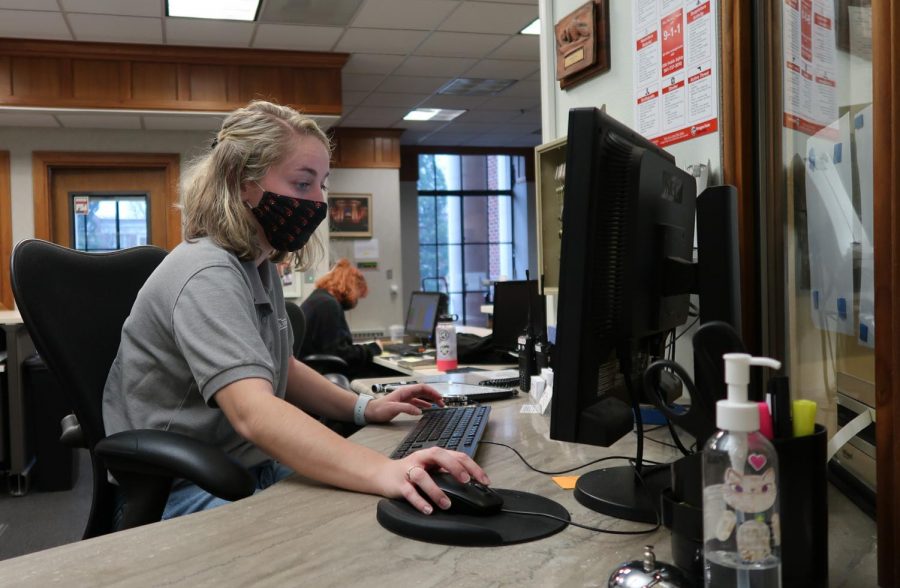ASOSU pushes for student wage increase to ‘fairly compensate’ student employees
November 29, 2021
Correction: a paragraph originally stating the Student Fee Committee endorsed the increase in wages has been corrected to state that it is the Congressional Budgets Committee, instead, who has endorsed this wage increase. The SFC as a whole has not formally endorsed anything.
Oregon State University’s student government has made strides to increase the minimum wage of student employment on campus to $15 per hour, which isn’t expected to affect student fees.
The work to create a $15 minimum wage began this academic year under the student administration of Dhru Patel and Dylan Perfect, the Associated Students of Oregon State University president and vice president, respectively.
The minimum wage is a part of a budget package that if passed, would increase pay for students, but only those employed in student fee funded units. Orange Media Network is a student fee funded unit that would be affected by this wage increase.
These units, funded by student fees, include Student Experience and Engagement—including diversity and cultural engagement—the Memorial Union, ASOSU, Recreational Sports, Intercollegiate Athletics, Family Resource Center, Human Services Resource Center and performing arts.
According to Uwe Keist, the ASOSU public relations coordinator, a hope of the increased wage is to encourage more students to be employed on campus and fill the many and much-needed positions available.
“We believe that a $15 minimum wage would fairly compensate the work demanded on students while simultaneously assisting students [to] cover basic needs such as rent, food [and] bills,” Keist said. “We hope to see that our efforts to $15 will extend to other non-fee funded student workers and departments.”
Fernanda Torres, a student employee with the Office of Admissions and the Memorial Union, said she loves the idea and supports ASOSU’s push for better wages.
“It [would be] a great opportunity for students not having to worry about finding a second job,” Torres said. “It would be nice to not have to have two jobs and to know I would be financially secure during my time as a student employee.”
Perfect, Patel and the Congressional Budgets Committee have already endorsed this plan as a high priority during this budget cycle.
The main issues Patel and Perfect planned to address in their positions were student employment, basic needs and sustainability. Perfect said this increased wage passage would make progress in all three aspects.
“Especially coming out of a pandemic, basic needs are critically important and I think having good-paying job opportunities on campus that students can apply for is a good way to address needs,” Perfect said.
So far the proposal has been adopted into a decision package by the Student Fee Committee and is up for a vote as the committee convenes throughout the upcoming weeks. The final vote is expected to take place on Dec. 3.
Once deliberations have been settled, the package will move to the ASOSU Congress for further negotiations and a final vote.
Perfect assumes there will be minimal issues getting the package through student lead levels ending with a signature from Patel before moving on to the university president and Board of Trustees to make a final vote.
Keist and Perfect both acknowledge there are some remaining university administration hurdles to jump.
If the new wage were to be implemented, the range of pay for student-fee funded positions, which is currently listed as $12 to $18 for many jobs, would need to be changed so the adjusted pay range is comparable to the current university-wide pay range.
“As long as our ask is reasonable, I think that [passing the wage package] should proceed without issue,” Perfect said.
According to Keist, the SFC has enacted a zero percent impact column, meaning the fees are only increased to serve student needs; just the minimum amount. While student fees normally increase in line with national inflation, the proposed $15 pay rate for students is not expected or intended to directly affect term fees for students.
“It is student fees at the end of the day and we are especially cognizant of how to make sure students are getting their return on investment and not paying fees that are just going to go to ‘nothing’ or will increase unnecessarily in future budgeting cycles,” Perfect said.











































































































